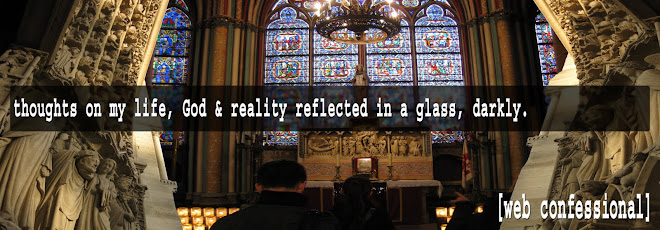in velvet elvis, rob bell, recommends the book, a brief history of everything, by ken wilber. rob received a lot of flack recommending a book by a zen buddhist philosopher. but i was intrigued that rob found this book so worth reading, and since i believe all truth is God's truth, i thought i would pick it up. i'm about half way through, and though i reject wilber's pantheistic view of God, i am finding a lot of thought-provoking content.
wilber explains that all of reality is made up of "holons." holons are nothing more than anything that is a whole, yet is also a part. for example, an atom is its own entity, but it is also part of a molecule. and likewise, a molecule is something in and of itself, yet is also part of a cell. wilber then explains that as holons go into deeper levels of complexity (e.g. atoms to molecules) there become fewer of them. to put it another way-- there are more atoms than there are humans, which are made of atoms.
the implication that human beings are holons themselves is obvious. i spend a lot of time as a social work student learning about systems theory. put simply, systems theory theorizes that human being are and function in systems. our bodies are made up of organ systems, and we live and work in social systems e.g. families, neighborhoods, communities, governments etc. we are wholes and we are parts. the big question i have in all of this is that just like atoms work together to create molecules, which work together to create cells, is there something greater that we create when we work together? or, just like there are forces that hold atoms and molecules together to work in a functionally, orderly way, what forces hold people together?
what are the implications in all of this for christianity?
the bible is rife with commands to love others, your neighbor, your brother and to love God. in fact, there is a strong connection with loving God and loving people. the bible, in many regards, is a book about relationships-- what happens when they are good, and what happens when they go wrong. the apostle paul teaches that the church-- a group of people loving each other and loving God-- are to be christ's body. maybe paul was one of the first systems theorists. he seems to be saying that people are to be bonded together by the force of love, or agape, and live in this higher, functional way. which leads me to wonder that maybe there is something deeper going on when people start getting emotional and all touchy-feely in intense worship services, or listening to speakers that seem to tap into something or hit a nerve.
what if the bible is the story of people plugging into the force that binds humans together and takes them to higher levels of complexity? just like sub-atomic particles form atoms, atoms form molecules, molecules form cells, cells form tissue, tissue form organs, organs form organ systems, and organ systems form us... what do we form? what are we meant to form?
i think spirituality is rooted in relationships and community; and i'm really not interested in God being proven by miracles or supernatural phenomenon, which i think is what many people think of as "spiritual." jesus had some strong words for people begging him for miracles. so needless to say, i'm finding a lot of stimulating ideas in ken wilber's writings, and in many regards because of some of the ideas in his book, God seems realer and closer than before.
Subscribe to:
Post Comments (Atom)

No comments:
Post a Comment